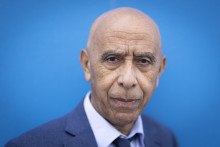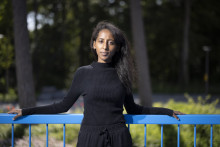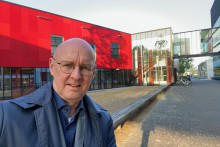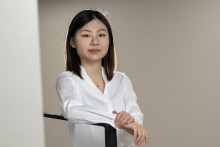‘I’ve had a challenging life,’ Tekie Leonida shares his story, which begins in Ethiopia and leads all the way to the UT’s chair of Stochastic Operations Research. ‘Both my mother and my father died within one month when I was only six years old. That was very difficult for me. After their death, I joined an orphanage, but it had to close down shortly after. After that I had to rely on help of others. I stayed with my aunt for a short time, but she was extremely poor and couldn’t afford to help me or send me to school. I couldn’t continue my education for a while.’
Leonida reached out to his half-brother who was able to help him. Eventually he was accepted to a boarding school and later on to a university. He acquired a Master’s degree in Mathematics in Ethiopia and, many years later, he obtained his PhD at the University of Groningen. Making this step, however, certainly wasn’t easy.
‘After acquiring my Master’s degree, I was teaching mathematics at various places in Ethiopia,’ says Leonida. ‘At one point, things turned very bad. Due to military developments in the country, I was put on the government’s kill list – simply because of my background. I had to flee and I was saved only because the rebels came and defeated the military government. My younger brother was sadly killed at that time. He wasn’t saved.’

The Netherlands
When Eritrea gained independence, Leonida moved there together with his family. ‘There was a good atmosphere. People were working with enthusiasm and a newfound sense of liberty,’ he describes. ‘But after some years, things started deteriorating. I was working at a university, but it was very difficult. We weren’t treated fairly. I needed some medical treatment, which could not be done locally, but I was not allowed to leave the country to get it. I was also not allowed to continue my PhD studies.’
‘I managed to get my PhD only thanks to the unyielding efforts and help of my Dutch friends’
‘I managed to eventually get my PhD only thanks to the unyielding efforts and help of my Dutch friends,’ says Leonida. ‘I came to the Netherlands for the first time in 1995 to establish a linkage programme between University of Groningen and our local university. Many of my students used this programme, but I wasn’t allowed to. At one point, my Dutch coworkers asked me why that was, why I couldn’t continue my PhD studies. I told them my story and they decided to help me. They told me to prepare a PhD proposal and it was accepted.’

Scattered across the world
After acquiring his doctoral degree, Leonida returned to Eritrea but the local situation was going from bad to worse. ‘My family was forced to leave the country,’ he states. ‘I have five children and they were scattered all across the world. Most of them are with my wife in the USA now. I haven’t seen my children for ten years; and I haven’t seen my wife for twenty years. She fled the country earlier and I had to take care of the children alone. It was very challenging but I managed. They are all okay and safe now, but I haven’t been able to see them. My wife applied for a family reunion visa, but it was rejected. A few years ago, the UT also allowed me to go to a conference in the US. They tried everything they could, but the embassy in the US rejected my application and I was not able to travel there.’
‘I haven’t seen my children for ten years’
‘In 2006, the government in Eritrea closed down the one last remaining university in the country,’ continues Leonida. ‘Suddenly there were no universities left. After a long process, I was able to go to Sudan for a medical treatment and afterwards I went to Ethiopia for one year, but I could only stay there as a refugee. I contacted the Scholars at Risk network and asked them for help. With the assistance of the UAF (Foundation for refugee students and professionals), they were able to find a position here at the University of Twente.’
Safe in Twente
This was seven years ago. Since 2015, Tekie Leonida has been teaching Mathematics and Statistics at the UT, as well as doing his own research. ‘It’s a very nice environment and I consider this a very good opportunity. It’s been a wonderful stay. The students here are very nice, disciplined and cooperative. I really like teaching here. I love teaching. I have always enjoyed it, wherever I go. The staff members are all also very nice and helpful. In general, everyone has been amazing.’

‘I officially retired in September, but I plan to continue teaching,’ he adds. ‘I don’t know how else to reciprocate the kindness of the people and the university. I will do my best to give back. For example, I’m thinking of starting a free tutorial and continue my research. I want to stay in touch with my students and give help to those who need it. I’d like to volunteer, maybe as a consultant for refugees. They have a wonderful opportunity here, they need to use it. I’d like to help them do that.’
‘I feel at home here, I have many friends and I have been granted a permanent residency, and so I’m quite happy,’ says Leonida. ‘But I feel sad for the situation in Ethiopia and Eritrea. It’s very depressing to think of all the people who are starving and dying there, through no fault of their own. Sometimes that interferes with my life. But I’m very lucky. I’m here, I’m safe and protected.’
special thanks
Tekie Leonida: ‘I’d like to offer special thanks to Scholars at Risk and to UAF. They allowed me to continue my career in a free and independent environment. I also want to express my profound gratitude to the University in Twente in general, and to my department in particular. I feel very grateful to all my colleagues and students. You have made my work enjoyable. Thank you to all the people who have positively influenced my life, all my friends and family.’








